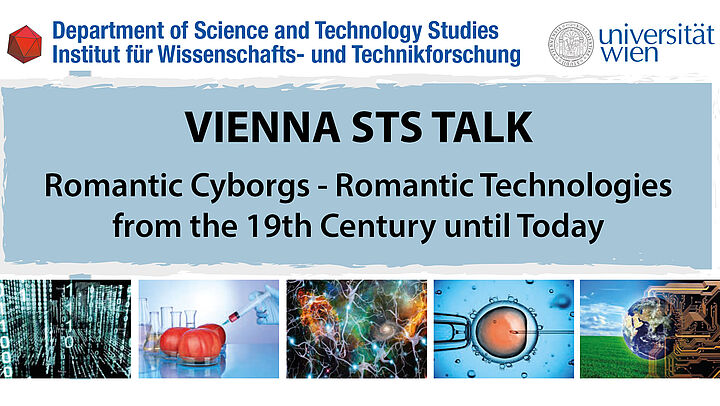Mittwoch, 18. April 2018, 17:30 - 19:00 iCal
Vienna STS Talk
Romantic Cyborgs - Romantic Technologies from the 19th Century until Today - Mark COECKELBERGH (University of Vienna, Austria)
Department of Science and Technology Studies / Seminar Room / Staircase II / 6th floor (NIG)
Universitätsstraße 7, 1010 Wien
Antrittsvorlesung, Public Lecture
Romanticism is often regarded as a movement of the past. And just as culture and technology are often seen as opposites, romanticism and technology seem to have little to do with one another. In this talk Mark Coeckelbergh argues that in order to understand our contemporary use of, and discourse about, technologies we need to reveal, understand, and critique a romantic material-cultural history that started around 1800 and reaches into the recent history and present of digital technologies. He argues that this approach, here close to cultural studies and history of ideas, does not go against the empirical turn in philosophy of technology and in science and technology studies, but that a more holistic view of the
meaning and use of technology (see Using Words and Things, Routledge 2017) instead helps us to reembed the all too isolated material artefact in a wider context and history.
Drawing on his book "New Romantic Cyborg" (MIT Press 2017), Coeckelbergh first focuses on the past. He shows that while there are strands in romanticism that react against technology, there are also versions
that try to realise their romantic ideals in a very material and scientific way. He draws a line from the romantic sciences of the 19th century to 20th century science-fiction and the counterculture of the 1960s and 1970s, when the romantic (hippie) computing emerged that still influences our view of computing today. Then he turns to contemporary technologies and ideas about future technologies, such as virtual reality, computer games, robots, augmented reality, uploading, cyborgs, and transhumanist enhancement, which each in their way are used for romantic purposes and can therefore be called "romantic technologies" - a term which goes beyond the material/culture dichotomy, which is still sustained by empirical turn researchers. Now this romantic DNA implies that today we inherit all the philosophical and ethical-political problems raised by a romantic view on
the world. He then asks if, given the problems with romanticism, we can move beyond it. But this, he shows, is a lot more difficult than we may suppose. It seems that we are trapped in romanticism. Or is there an exit? Can thinking provide that exist, or do we need a different kind of technology?
Veranstalter
Institut für Wissenschafts- und Technikforschung
Kontakt
Corinna Wegscheider
Insitut für Wissenschafts- und Technikforschung
+431427749601
corinna.wegscheider@univie.ac.at
Erstellt am Donnerstag, 29. M�rz 2018, 11:36
Letzte Änderung am Mittwoch, 04. April 2018, 08:44

